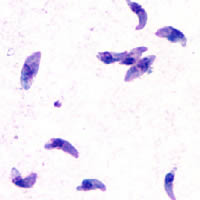
Photo from wikipedia
Toxoplasma gondii is an intracellular protozoan parasite that can remarkably infect, survive, and replicate in almost all mammalian cells and can cause severe neurological and ocular damage in immunocompromised individuals.… Click to show full abstract
Toxoplasma gondii is an intracellular protozoan parasite that can remarkably infect, survive, and replicate in almost all mammalian cells and can cause severe neurological and ocular damage in immunocompromised individuals. It is known that Natural Killer cells (NK cells), as a type of cytotoxic lymphocyte, have critical protective roles in innate immunity during the T. gondii infection through releasing interferon gamma (IFN-γ). Interleukin 12 (IL-12) is a pivotal critical cytokine for the generation of IFN-γ-producing NK cells. Several studies have shown cytokines' impact on NK cell activation; and IL-2 has an important role with a potent stimulatory factor for NK cells. In this review, we summarized the mechanism of interleukin-12 production stimulation by T. gondii tachyzoites and discussed several factors affecting this mechanism.
Journal Title: Parasitology research
Year Published: 2021
Link to full text (if available)
Share on Social Media: Sign Up to like & get
recommendations!